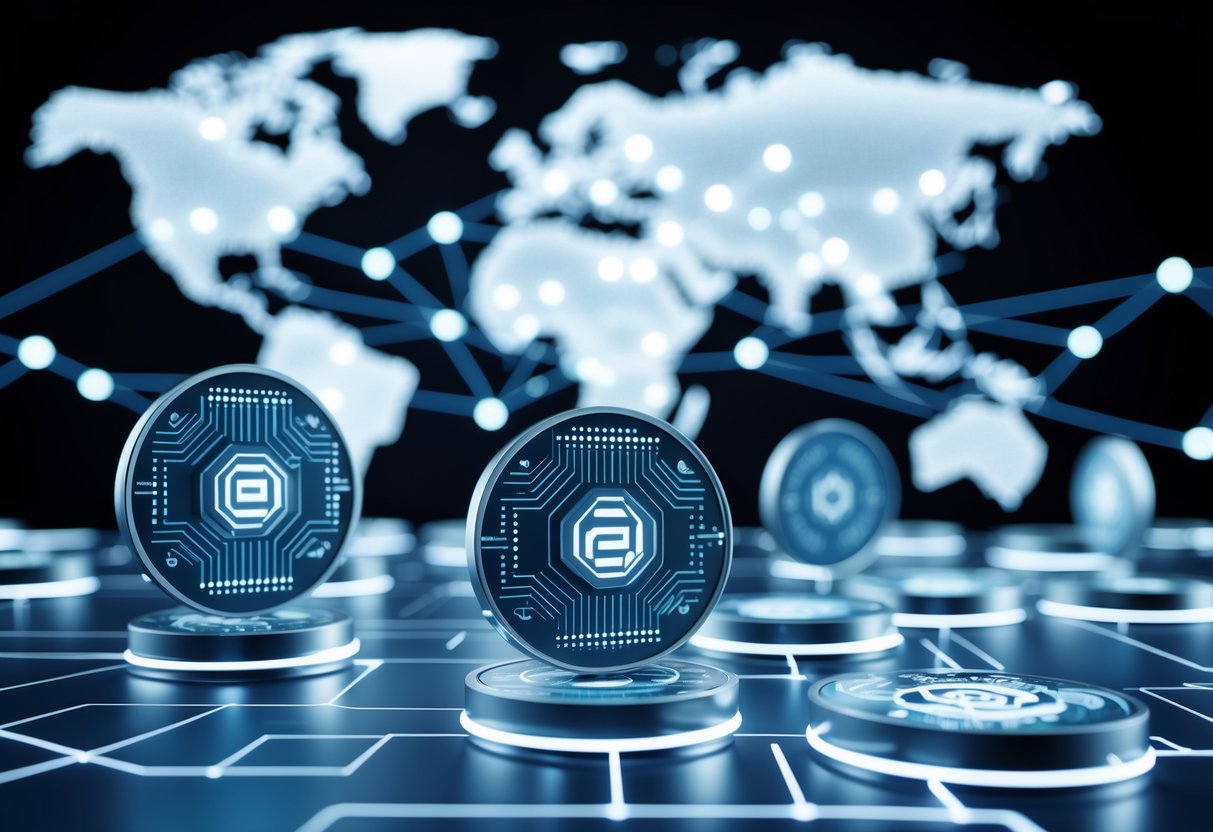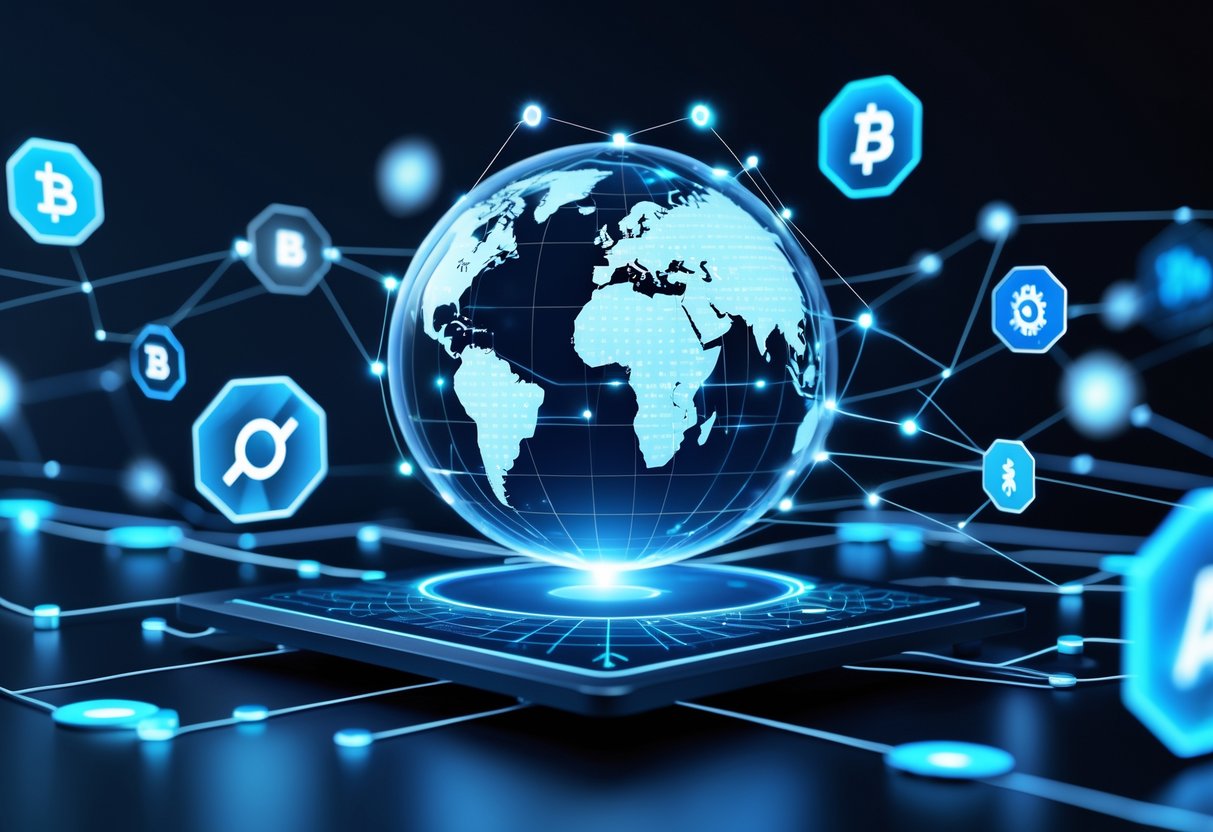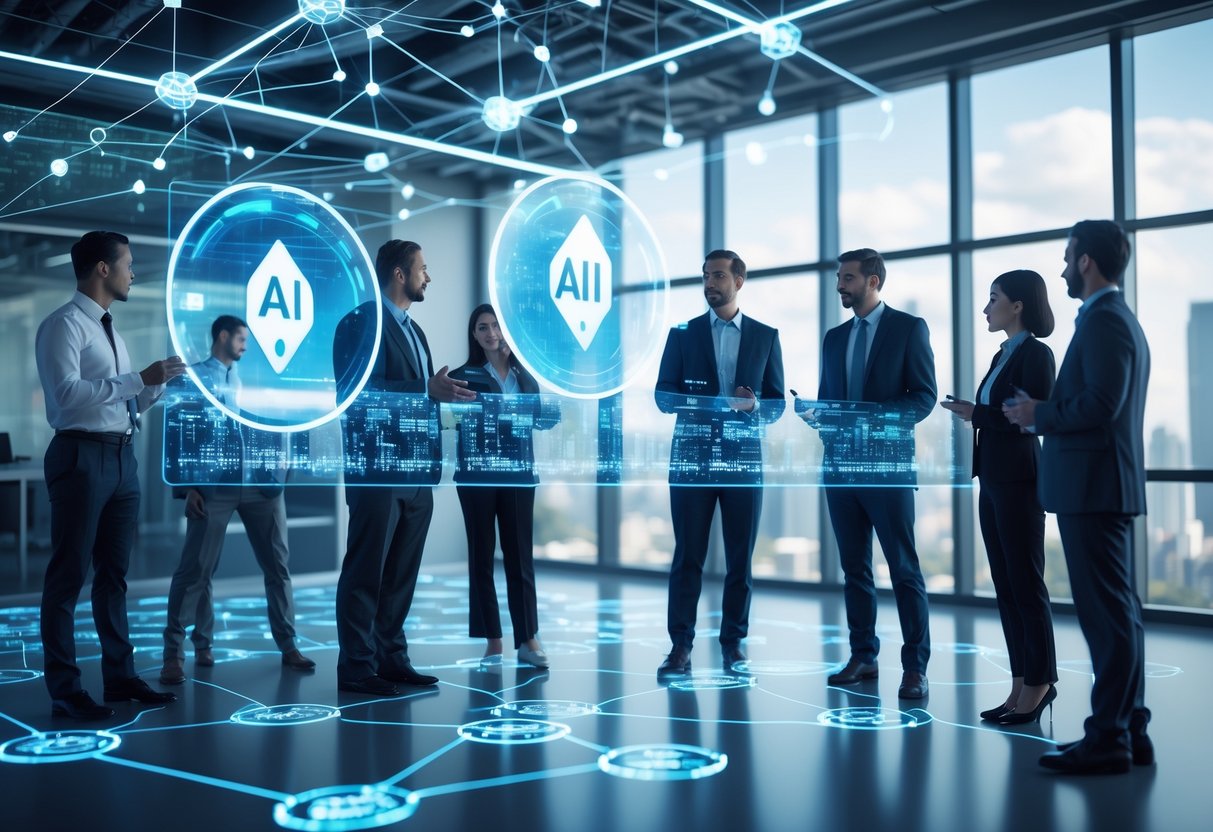
Decentralized AI tokens are emerging as powerful players in the cryptocurrency market for 2025. These tokens combine artificial intelligence capabilities with blockchain technology, creating systems that operate without central control. The most promising decentralized AI projects include SingularityNET, Fetch.AI, and Render Token, which provide unique solutions while maintaining their decentralized nature.

See Rewards Linked to This Topic—Follow Steps to Get:
Great news—exclusive perks are just a few steps away! Follow these simple actions to unlock bonuses linked to this topic!
How It Works (Fast & Easy!)
1️⃣ Check Your Rewards in Seconds
→ Click Here to See How Much You Qualify For (No commitment!)
First-time withdraw can unlock 7K+ USD.
2️⃣ Connect Your Wallet
Use any mobile or desktop wallet (MetaMask, Trust Wallet, etc.)—approved in seconds!
3️⃣ Cash in Your Pocket in 15 Minutes!
Get your funds fast—no credit checks, no waiting.
Why This is a Game-Changer 💎
✔ Each month there is a free offer reward for all users.
🔥 Limited-Time Offer – Claim Your $7K+ Now!
👉 Get Instant Access Here
No hidden fees. No credit checks. Just fast cash against your crypto! – and this is not a financial advice.
The market for these tokens has shown impressive growth, with Fetch.AI reaching a market cap of approximately $3.3 billion. Many of these platforms offer robust APIs that allow for easy integration across decentralized applications, making them accessible to developers and businesses alike. SingularityNET, Fetch.AI, and Ocean Protocol have even discussed a potential merger to strengthen their position in the market.
These AI cryptocurrencies serve different purposes within the blockchain ecosystem. Render Token focuses on decentralized rendering services, connecting those with spare GPU power to those needing high-performance graphics capabilities. Fetch.AI builds smart infrastructure with machine learning at its core. SingularityNET provides an open-source marketplace for AI products and services, allowing users to exchange models, data, and AI training tools.
Fundamentals of Decentralized AI Tokens

Decentralized AI tokens combine artificial intelligence technology with blockchain infrastructure to create new economic models for AI development and usage. These tokens enable access to AI services, incentivize network participation, and provide governance rights within decentralized AI ecosystems.
Understanding Decentralized AI
Decentralized AI (DeAI) represents a shift away from centralized AI systems controlled by large tech companies. DeAI aims to distribute AI development and deployment across networks of independent participants. This approach focuses on three core components: data, compute, and algorithms.
Unlike traditional AI systems where data and models are controlled by single entities, decentralized AI promotes open access and collaborative development. Users maintain ownership of their data while contributing to collective intelligence.
Blockchain technology serves as the foundation for DeAI, enabling transparent and verifiable AI operations. This combination creates more democratic AI systems where benefits are shared among participants rather than concentrated with a few corporations.
How AI Tokens Operate
AI tokens function as utility assets within decentralized AI ecosystems. These crypto tokens grant holders access to specific AI services like predictive modeling, data analysis, or content generation.
The tokens serve multiple important functions:
- Access rights to AI-powered services and applications
- Incentives for contributing data, computing resources, or model improvements
- Governance allowing token holders to vote on protocol changes
- Value exchange for AI services between buyers and sellers
When users want to utilize an AI service on a decentralized platform, they pay with the platform’s native tokens. This creates a circular economy where token value increases with platform usage and utility.
Smart contracts automatically execute transactions when conditions are met, ensuring fair payment for AI services without middlemen.
Role of Blockchain in AI Token Ecosystems
Blockchain technology provides the essential infrastructure for decentralized AI tokens to function effectively. The immutable ledger ensures transparent tracking of AI model training, data usage, and token transactions.
Web3 principles combine with AI to create trustless systems where:
- Data providers maintain control over their information
- Model developers receive fair compensation
- Users access AI services without centralized gatekeepers
Smart contracts automate agreements between parties, handling token distribution when AI services are delivered or data is shared. This reduces friction and enables micro-transactions that would be impractical in traditional systems.
Security is enhanced through cryptographic protection, making AI token ecosystems resistant to tampering. The decentralized nature also improves resilience, as there’s no single point of failure that could compromise the entire network.
Leading Decentralized AI Tokens and Projects

The decentralized AI ecosystem has expanded rapidly, with several key tokens emerging as frontrunners in combining artificial intelligence with blockchain technology. These projects are addressing critical challenges in AI accessibility, data ownership, and computational resource sharing through innovative tokenomics and use cases.
Major AI Token Platforms
SingularityNET (AGIX) stands as one of the pioneering decentralized AI networks, creating a marketplace where anyone can create, share, and monetize AI services. Founded by Dr. Ben Goertzel, it aims to prevent AI monopolization by large corporations.
Fetch.ai (FET) uses machine learning and blockchain to create an ecosystem of autonomous economic agents that can perform tasks without human intervention. FET tokens power these transactions and secure the network.
Bittensor (TAO) has gained significant traction as a decentralized machine learning network where participants earn TAO tokens by contributing useful AI models and computations. Its innovative approach has made it one of the top-performing AI tokens in 2025.
Ocean Protocol enables secure data sharing while preserving privacy, allowing data owners to monetize their information without losing control. Its token (OCEAN) facilitates these marketplace transactions.
Ecosystem Tokens and Alliances
The Artificial Superintelligence Alliance (ASI) represents a powerful collaboration between multiple projects including SingularityNET, Ocean Protocol, and several other partners. This alliance aims to create interoperable AI systems that benefit humanity.
Filecoin and The Graph (GRT) provide crucial infrastructure for decentralized AI. Filecoin offers decentralized storage solutions for large AI datasets, while GRT indexes blockchain data to make it queryable for AI applications.
Numerai (NMR) uses its token to coordinate a global network of data scientists who build prediction models for financial markets. Contributors stake NMR tokens on their models’ performance, creating an innovative incentive system.
AIOZ Network and Render Network focus on distributed computing power for AI rendering and processing, using their respective tokens to compensate node operators who provide GPU resources.
Notable Use Cases and Applications
Decentralized AI tokens enable powerful applications across various industries. In healthcare, projects like SingularityNET facilitate secure sharing of medical data for improved diagnostics while protecting patient privacy.
Predictive analysis represents another major use case, with Fetch.ai’s agents helping businesses forecast market trends and optimize operations. These systems use machine learning models trained on decentralized data.
Developer tools built on platforms like Near Protocol and Internet Computer are making AI more accessible. They provide frameworks for creating AI-powered dApps without requiring deep expertise in both blockchain and artificial intelligence.
Golem (GLM) and other computation marketplaces allow developers to run resource-intensive AI models without investing in expensive hardware. Users can rent computing power using tokens, democratizing access to advanced AI capabilities.
Key Benefits and Challenges of Decentralized AI Tokens

Decentralized AI tokens represent the intersection of blockchain technology and artificial intelligence, offering unique advantages while facing notable hurdles. These tokens enable new models of data sharing, computational resource allocation, and community governance.
Innovation and Ecosystem Growth
Decentralized AI tokens fuel innovation by creating incentive structures that were impossible in traditional AI development. Projects using these tokens can reward contributors who provide valuable data, computing power, or model improvements. This creates a self-sustaining ecosystem where participants benefit directly from their contributions.
The token economy enables new business models where AI resources are shared among network participants rather than controlled by single entities. For example, users can earn tokens by sharing their computing resources or unique datasets.
Blockchain technology provides the foundation for these systems, allowing for transparent tracking of contributions and fair distribution of rewards. This approach has already sparked development in areas like decentralized machine learning, prediction markets, and AI-powered DeFi applications.
These innovations open AI development to a broader community, potentially accelerating progress beyond what centralized organizations could achieve alone.
Security, Trust, and Transparency
Decentralized AI tokens enhance security through blockchain’s immutable ledger system. Every transaction and data exchange is recorded permanently, creating a trustless environment where participants don’t need to rely on central authorities.
Key security benefits include:
- Data integrity protection through cryptographic verification
- Transparent AI model training history
- Immutable record of token distribution and governance decisions
The transparency inherent in blockchain systems helps build trust in AI systems that traditionally operate as “black boxes.” Users can verify how data is used and how models are trained.
Data privacy also improves as users maintain control over their information, choosing when and how to share it. Rather than surrendering data to corporations, individuals can selectively participate in AI training while receiving compensation through tokens.
These security features address many concerns about centralized AI systems, particularly regarding data exploitation and algorithmic bias.
Challenges: Volatility and Regulation
Decentralized AI tokens face significant challenges that could limit their adoption. Token volatility represents a major hurdle, as price fluctuations can disrupt the economic models these systems rely on. When token values swing dramatically, it becomes difficult to establish stable pricing for AI services.
Regulatory uncertainty creates another obstacle. Many jurisdictions haven’t established clear frameworks for AI tokens, leaving projects in legal limbo. This uncertainty deters institutional investment and mainstream adoption.
Technical challenges also persist. Questions about scalability remain unsolved as blockchain networks struggle with transaction throughput needed for AI applications.
Common challenges include:
- Market volatility affecting token utility
- Regulatory compliance across different jurisdictions
- Technical limitations of current blockchain infrastructure
- Balancing decentralization with performance requirements
Additionally, the complexity of these systems creates a steep learning curve for potential users. For decentralized AI tokens to succeed, these barriers must be addressed through technical innovation and thoughtful governance structures.
Future Outlook for Decentralized AI Tokens
Decentralized AI tokens stand at the crossroads of blockchain innovation and artificial intelligence advancement. Their future appears promising as new technologies emerge and market dynamics evolve in this rapidly changing landscape.
Emerging Technologies and Alliances
Decentralized AI tokens will likely benefit from several key technological developments in the coming months. The Artificial Superintelligence Alliance (ASI Alliance) is forming partnerships with major AI developers to create more robust token ecosystems. These collaborations aim to integrate advanced machine learning capabilities with blockchain infrastructure.
Nightshade technology is emerging as a protective measure for AI-generated content, potentially creating new token use cases around content verification and ownership. This could be particularly valuable as OpenAI and similar organizations continue expanding their capabilities.
Web3 infrastructure improvements are making AI tokens more practical for everyday applications. Smart contracts are becoming more sophisticated, allowing for complex AI operations to execute automatically on blockchain networks.
Several tokens are now implementing decentralized computing resources that allow AI models to run without centralized servers, significantly reducing costs while increasing privacy.
Predictions and Market Trends
The market capitalization of AI tokens exceeded $60 billion in 2024, with many tokens seeing 400% price increases. Analysts predict this growth trend will continue through 2025-2026 as functional decentralized AI products finally reach mainstream adoption.
Tokens focusing on predictive analysis for financial markets are gaining particular attention from institutional investors. These tools offer transparent, manipulation-resistant insights that traditional financial systems cannot match.
Governance tokens that allow holders to vote on AI development directions are expected to become especially valuable. As questions about AI safety grow more important, the ability to influence development paths will likely command premium prices.
The integration of AI agents capable of managing crypto portfolios autonomously represents another promising direction. These agents can learn from market patterns and execute trades more efficiently than human traders.
Competition will intensify as more projects enter the space, but tokens with actual utility beyond speculation will likely emerge as long-term winners in this evolving ecosystem.
Frequently Asked Questions
Decentralized AI tokens are creating new opportunities for investors and tech enthusiasts alike. These innovative assets combine artificial intelligence capabilities with blockchain technology, offering unique value propositions in the evolving digital economy.
What criteria should be considered when evaluating the potential of AI crypto coins?
When evaluating AI crypto coins, look first at the underlying technology and its real-world applications. The strength of the development team and their track record matters significantly.
Market capitalization and trading volume provide insights into liquidity and market interest. Check if the project has meaningful partnerships with established tech companies or research institutions.
The token’s utility within its ecosystem is crucial – does it serve a necessary function or is it merely speculative? Projects with clear roadmaps and transparent governance tend to perform better long-term.
How can investors identify the best-performing AI-based cryptocurrencies?
Investors should track performance metrics across multiple timeframes rather than focusing on short-term price movements. The best AI cryptocurrencies typically show steady development progress and growing adoption.
Technical analysis can help identify entry and exit points, while fundamental analysis reveals the project’s intrinsic value. Community engagement levels often signal project health – active GitHub repositories and developer activity are positive indicators.
Consider market sentiment but avoid making decisions based solely on social media hype. The most successful AI tokens solve specific problems and have sustainable tokenomics models.
Which platforms are recommended for trading AI-focused crypto tokens?
Major centralized exchanges like Binance, Coinbase, and Kraken offer secure trading environments for established AI tokens. These platforms provide good liquidity and user-friendly interfaces for beginners.
Decentralized exchanges (DEXs) such as Uniswap and SushiSwap offer access to newer AI token projects that haven’t yet reached major exchanges. However, they require more technical knowledge to use safely.
For serious investors, platforms with advanced analytical tools like trading view integration and detailed market data are worth considering. Always prioritize exchanges with strong security measures and regulatory compliance.
What are some promising AI crypto projects to watch in 2025?
Decentralized AI platforms focusing on democratizing access to AI computation are showing significant promise. Projects building federated learning systems where data remains private while contributing to model training are gaining traction.
Tokens that power natural language processing services and computer vision applications demonstrate clear utility. AI governance projects that help manage the ethical deployment of AI systems address growing regulatory concerns.
Cross-chain AI projects that can operate across multiple blockchains position themselves for wider adoption and interoperability. Look for projects with both technical innovation and sustainable business models.
What are the advantages of investing in AI-driven cryptocurrencies?
AI-driven cryptocurrencies offer exposure to two revolutionary technologies simultaneously: artificial intelligence and blockchain. This combination creates unique growth potential as both fields continue rapid development.
These tokens often provide governance rights in decentralized AI systems, giving investors a voice in project direction. Early investors in successful AI projects may benefit from network effects as platforms gain users and utility.
The technology addresses real market inefficiencies in data markets, computation distribution, and AI model accessibility. As traditional AI becomes increasingly centralized, decentralized alternatives may provide competitive advantages through community innovation.
How do AI cryptocurrency coins integrate with blockchain technology?
Decentralized AI tokens utilize blockchain for transparent, immutable record-keeping of AI model training and predictions. Smart contracts automate payments for AI services without requiring intermediaries.
Blockchain provides the infrastructure for distributing rewards to network participants who contribute computing resources or data. The technology enables verifiable credentials and reputation systems for AI service providers.
Token economics create incentives for network participation while discouraging harmful behaviors. Zero-knowledge proofs and other privacy-preserving technologies allow sensitive data to be used in AI training without revealing the underlying information.
Leave a Reply